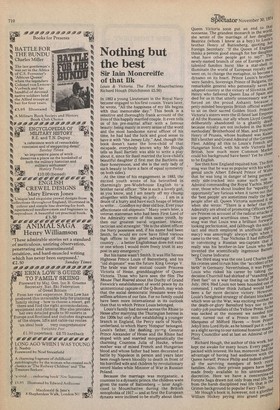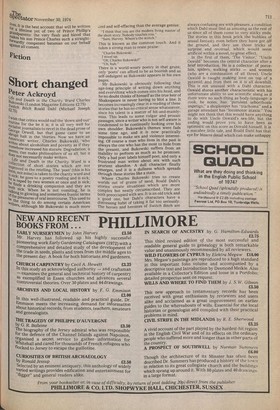Nothing but the best
Sir lain Moncreiffe of that Ilk
Louis & Victoria. The First Mountbattens Richard Hough (Hutchinson 0.50)
In 1883 a young Lieutenant in the Royal Navy became engaged to his first cousin. Years later, he wrote, "All the happiness of my life begins with that memorable day." This book is a sensitive and thoroughly frank account of the lives of this happily married couple. It even tells us of his pre-marital affair with a famous beauty: being manly in every sense of the word and the most handsome naval officer of his time, he had had the luck and good sense to have it with "the Jersey Lily." And, though the book doesn't name the love-child of that escapade, everybody knows why Mr Hough tells us Basil Bartlett was able to write a play about it, since Sir Basil married the love-child's beautiful daughter (I first met the Bartletts on their honeymoon, and she is the only lady of such beauty to have a face of equal symmetry on both sides).
At the time of his engagement in 1883, the excited youth wrote of his betrothed in charmingly preWodehouse English to a brother naval officer: "She is such a lovely girl, as you know, and I am nearly off my chump altogether with feeling so jolly . . I am in a deuce of a hurry and have such heaps of letters to write .. Goodbye my dear old boy, Ever your affectionate old shipmate." Many years later, a veteran statesman who had been First Lord of the Admiralty wrote of this same youth, by then our greatest naval organiser, trainer, tactician and strategist: "He is the ablest officer the Navy possesses and, if his name had been Smith, he would ere now have filled various high offices to the great advantage of the country ... a better Englishman does not exist or one whom I would more freely trust in any post in any emergency."
But his name wasn't Smith. It was His Serene Highness Prince Louis of Battenberg, and his "old shipmate" was the future King George V. The bride was their mutual cousin Princess Victoria of Hesse, granddaughter of Queen Victoria. Those who have seen the film The Mouse That Roared about the Duchy of Grand Fenwick's establishment of world peace by its unintentional capture of the Q-Bomb, may wish that the social democratic Hessians were the selfless arbiters of our fate. For no family could have been more international in its outlook than that to which Prince Louis belonged.
Louis's family had moved across the Rhine to Hesse after marrying the Thuringian heiress in the 1200s but only after establishing a younger branch in England, the Percy earls of Northumberland, to which Harry 'Hotspur' belonged. Louis's father, the dashing young General Prince Alexander of Hesse and the Rhine had eloped with and married morganatically the charming Countess Julia of Hauke, whose _ mother was of mixed French and Hungarian blood and whose father had been decorated in battle by Napoleon in person and years later been rough-hewn bloodily to death in front of his horrified wife and children by revolutionary sword blades while Minister of War in Russian Poland.
Because the marriage was morganatic, a countess to a dynastic prince, the children were given the name of Battenberg later Anglicised to Mountbatten during the British xenophobia of 1917 — and at first the European dynasts were inclined to be stuffy about them.
Spectator November 30,1974 nQouneseennseV The grandestsoon put an end to that grandestmo of her the
she wrote of the marriage daught
ried; Beatrice (whom I knew as a boy) to Louis's brother Henry of Battenberg, quotingher, Foreign Secretary: "If the Queen of Englanu thinks a person good enough for her daughter what have other people got to say? This, newly-named branch of one of Europe's mos` talented families burst like a star-shell to illuminate the world of European royalty and went on, to change the metaphor, to become a dynamo on its heart. Prince Louis's brothers were Sandro, Sovereign Prince of Bulgaria, the remarkable general who personally saveshi,s, adopted country at the victory of Slivnitza. an; Henry who fathered Queen Ena of Spain an died for us in that utterly unnecessary war We forced on the proud Ashanti because a, petty-minded bourgeois British official wanta to sit on their sacred Golden Stool. Princess Victoria's sisters were the ill-fated last En1Pres! of All the Russias, our ally whom Lloyd Georg,' deliberately abandoned to a ghastly demo because royalty are not included in the We methodists' Brotherhood of Man, and Princess Henry of Prussia, whose husband was Kaiser Bill's brother and Grand Admiral of the Germs!! Fleet. Adding all this to Louis's French Hungarian blood, with his wife Victoria hay British, how much more Common Market could his background have been? Yet he chnse to be English. , See then how England requited him. The first snag was that he was so popular with his wif,eLs genial uncle Albert Edward Prince of Wal' that he was long in danger of being Perm all: ently side-tracked into some such role a° Admiral commanding the Royal Yachts. More,si over, those who shout loudest for "equafitY opportunity"are furious when it turns out tha: the 'best people' are sometimes really the Ns' people after all. Queen Victoria summed it tIP when she wrote: "There is a belief that the Admiralty are afraid of promoting Officers ighl are Princes on account of the radical attacks 0, low papers and scurrilous ones." The secoa, snag was that Louis was a brilliant forwaolf looking perfectionist, and (although the soui,° tact and much employed in unofficial diP10; macy) was annoyingly always right when I` came to the test. Tsar Nicholas II had difficult in convincing a Russian sea-captain that Id really was his brother-in-law Louis who ha invented the scientifically ingenious Battenberg Course Indicator. The third snag was the one Lord Charles arid his cronies used to ruin him: the "accident of his e birth" in Germany. Nevertheless, it was Prinuc,, Louis who risked his career by taking te decision Churchill had shirked of 26 Fleet Fleet fast" on a war footing on the fateftu b, July, 1914. Had Louis not been hounded out 0' command, I rather think Jutland would have been a far more decisive victory. Howe' Louis's farsighted strategy of distant blockaue' which won us the War, was exciting neither t! the death-or-glory Beresford boys nor to thee cushy-job journalists of the Yellow Press. So,h was sacked at the moment we needed hi113t. most, turned out of a Prince into the 1„se Marquess of Milford Haven from Prt,t Jekyll into Lord Hyde, as he himself put it as a slight saving to our national honour ma he Privy Councillor and at last an Admiral of to Fleet. Richard Hough, the author of this work, In: kept me awake for many hours. Every Pee packed with interest. He has, moreover, had advantage of having had audiences with the Queen herself, Prince Philip and indeed alln°71 all the surviving members of both families. Also, their private papers have °red made freely available to his untramMe°„A discretion. Here we have a concertina`i Forsyte Saga drawn not only from real life, but from the harsh disciplined real life that is the from background to popular Fairy-Tale.
Mr Hough's book is, however, not a glorlio• William Hickey prying into grand people'
lives / i It • s the best account that will be written ur a lifetime yet of two of Prince Phillip 's andParents: the very flesh and blood that l'aices his son Prince Charles such a straightervvardly competent batsman on our behalf against all corners.











































 Previous page
Previous page